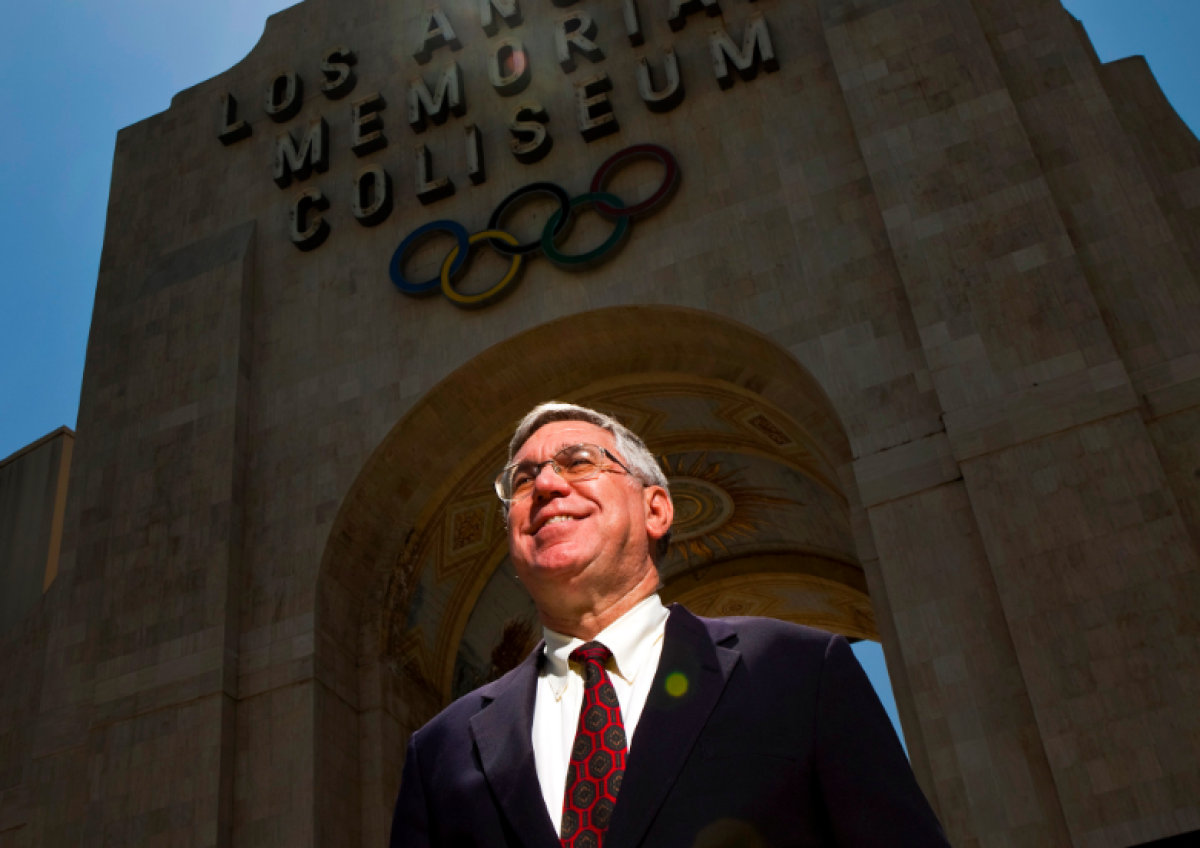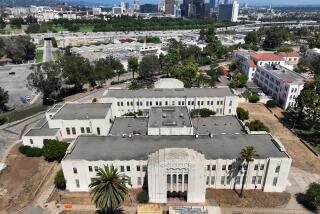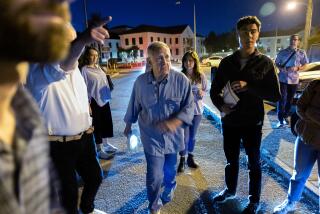From the Archives: Judge orders L.A. Coliseum documents released in secrecy lawsuit

A judge has ordered the Los Angeles Memorial Coliseum Commission to release documents it has withheld from The Times for as long as 20 months.
Los Angeles Superior Court Judge Luis A. Lavin made the ruling Friday as part of a sweeping condemnation of the commission’s conduct during months of secret talks on the USC deal.
Lavin also ruled that the top administrator of the commission, John Sandbrook, testified falsely as part of the agency’s efforts to thwart public scrutiny of USC lease negotiations in violation of state law.
In determining that the commission could not be trusted to obey open-government laws, Lavin issued an injunction barring the panel from discussing a range of topics behind closed doors and requiring it to record its meetings for three years.
His ruling came in a lawsuit filed against the commission by The Times and a 1st Amendment group and was based in significant part on Sandbrook’s deposition testimony in June. Sandbrook, a retired UCLA manager who took the helm of the commission as a financial scandal rocked it in 2011, testified for two days about the agency’s private lease deliberations and compliance with the California Public Records Act.
At a court hearing Thursday, Lavin singled out Sandbrook for criticism.
“I don’t think Mr. Sandbrook has any interest in transparency,” Lavin said.
Among the records the commission has refused to produce include communications between Sandbrook and USC during the lease negotiations. The Times requested those records 20 months ago; the law requires agencies to produce documents generally within 10 days of a request.
“It is puzzling that a commission that has been pummeled by allegations of financial misconduct and mismanagement would seek to hide documents from the public,” Lavin’s ruling said, “which will shed light on its decision to transfer its most important and public assets to a private university.”
Lavin also faulted the Coliseum for delaying the production of documents. They included records related to commission member and County Supervisor Mark Ridley-Thomas’ receipt of NFL tickets to a Carolina Panthers game, initially paid for by the public and later repaid by the county supervisor.
Lavin found that Sandbrook falsely stated under oath his reasons why the lease negotiations could be kept secret. His statements taken during a deposition by a Times attorney contradicted the prepared agenda Sandbrook had written.
“In light of the commission’s refusal to admit any wrongdoing, its aversion to transparency … and Sandbrook’s false testimony … the court finds that the commission will continue its unlawful practices,” Lavin wrote. He added that the Coliseum’s view on what it can discuss in secret “would decimate the letter and spirit” of the state’s open-meetings law.
After Lavin released his ruling Friday, City Councilman Bernard C. Parks, a former commissioner, called on the L.A. County district attorney’s office to launch a perjury investigation of Sandbrook.
“He should be prosecuted,” said Parks, who served on the commission throughout the USC deliberations. “It’s just appalling that he would be in the position of authority and that he would not be truthful.”
Parks, a former Los Angeles police chief, had given a sworn statement to the court supporting the allegations by The Times and Californians Aware that the commission violated the open-meeting law, the Ralph M. Brown Act. He opposed the USC lease.
Sandbrook did not respond to a request for comment. He was recruited for the Coliseum job by county Supervisor Zev Yaroslavsky, a longtime commissioner who has been Sandbrook’s friend since college. Yaroslavsky did not return a call for comment.
The suit alleged that the agency repeatedly ran afoul of the Brown Act and public records law while working behind closed doors to grant USC control of the taxpayer-owned Coliseum, the neighboring Sports Arena and nearly all of their revenue for 98 years.
“Certainly the public has a legitimate and substantial interest in scrutinizing the process leading to the commission’s deal with USC for the use and management of the iconic Los Angeles Memorial Coliseum and the Los Angeles Sports Arena,” Lavin wrote.
Alluding to controversy over whether the lease gave too much to USC, the ruling said openness was crucial “to ensure that the decision was not based on political favoritism or some other criteria that do not serve the public.”
“To paraphrase the late [U.S. Supreme Court] Justice Louis Brandeis, sunlight is said to be the best of disinfectants,” Lavin wrote. “Whether the commission gives away the store for free will be for others to judge and is beyond the scope of this lawsuit.”
State law allows parties who allege violations of the Brown Act and the Public Records Act to recover attorneys fees if they win in court. Times attorney Jeff Glasser said the newspaper will ask the judge to order the commission to pay its legal fees.
“We are gratified that the judge vindicated the public’s right of access to meetings and to the commission’s records,” Glasser said.
Commissioners, who also include County Supervisor Don Knabe and representatives of Gov. Jerry Brown, Mayor Eric Garcetti and City Council President Herb Wesson, could be held in contempt of court if they violate the decision.
Deborah Fox, the Coliseum’s attorney, did not respond to a request for comment.
Also:
Santa Ana winds: Red flag warnings across Southland
21 arrested for alleged sales of prescription drugs via Craiglist
Garcetti travels to New York City for mayoral meeting and fundraising
More to Read
Sign up for Essential California
The most important California stories and recommendations in your inbox every morning.
You may occasionally receive promotional content from the Los Angeles Times.












